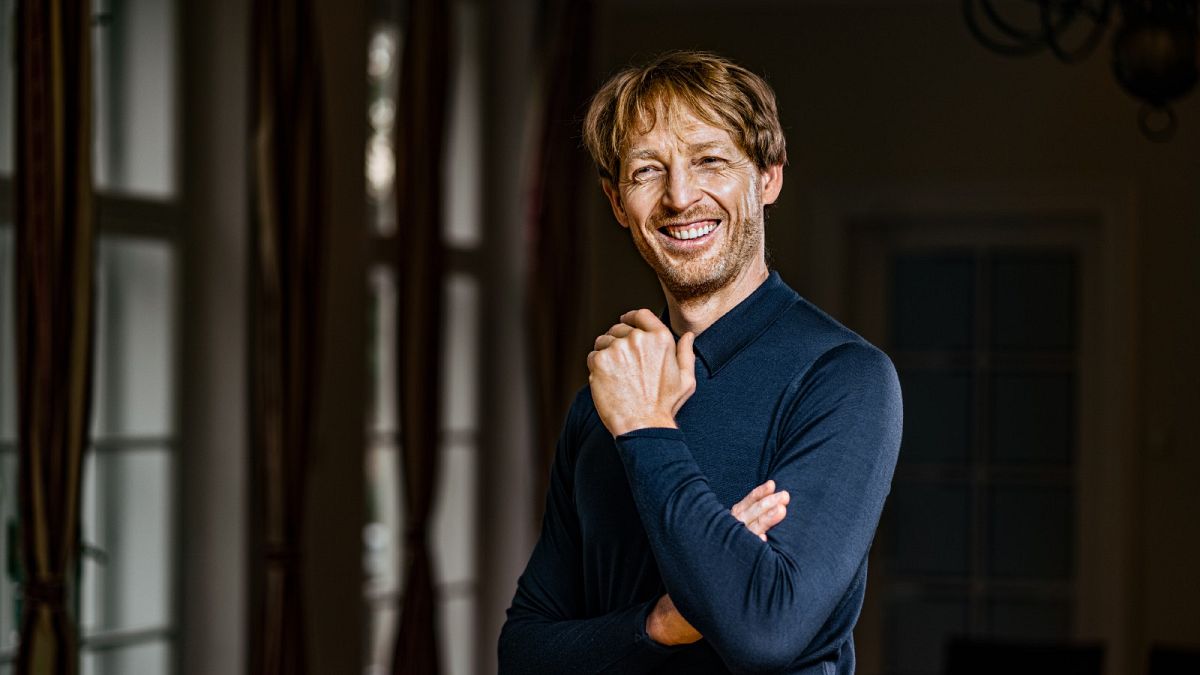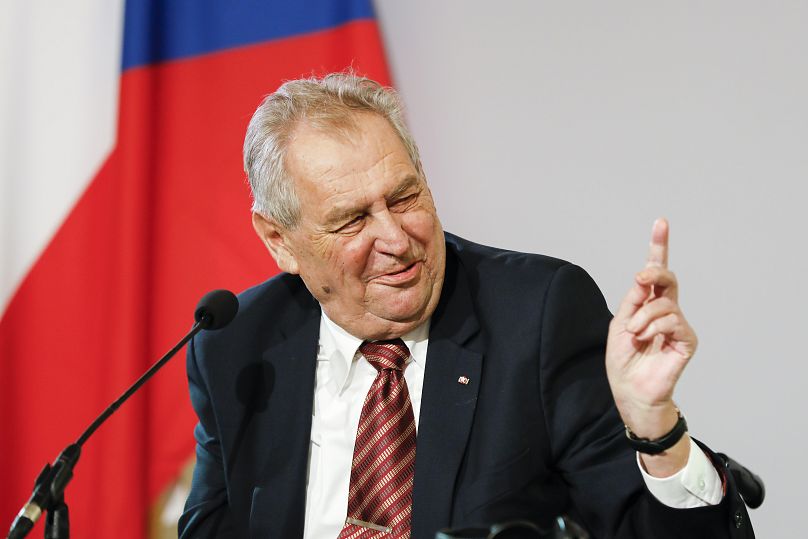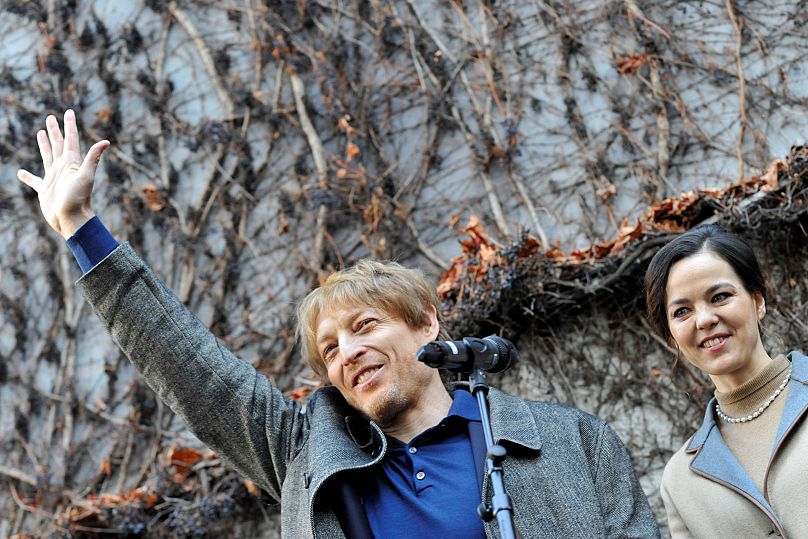“Janeček is the joker in the pack.”
Czech presidential elections are known for their colourful characters.
Billionaire Karel Janeček, 48, is seemingly one of them: he's been described as the “joker in the pack” ahead of next January’s vote.
Janeček cuts a quirky figure. A mathematician by trade, he is known for his scruffy ginger hair and esoteric views.
When asked by Euronews what he thinks are his chances of becoming president, he replied: “My chances are more than Phi = sqrt ((5)-1)/2”.
In other words, what mathematicians call the “golden ratio”.
What do we know about Karel Janeček?
Janeček’s fortune was made in the rather dull world of trading financial derivatives.
Yet, in the past, he publicly defended his polyamory — although he says he gave that up in 2020 — and has dabbled in Buddhism.
Known as an anti-graft campaigner and philanthropist, he has helped create various charities, from scientific research to anti-corruption.
He even devised his own election system dubbed the “D21–Janeček method”, which he says would rid graft from Czech politics.
More controversially, he has recently opposed vaccinating children and rails against what he says are the excesses of the state-enforced lockdowns.
Last November, the Neuron Endowment Fund, a scientific charity he helped to found, distanced itself from Janeček after he allegedly criticised the government’s pandemic measures during a speech at the Czech Nightingale music awards, for which he devised the voting system.
“I am running for the presidential elections with a vision of a modern, free and confident Czech Republic,” Janeček said.
“I will present myself as a courageous democratic candidate who speaks the truth and whose goal is to unite society and raise important issues.”
He launched his campaign with the slogan “This Is Us” and is now busy collecting the 50,000 signatures needed to formally put his name on the candidacy list for next January's ballot, the third directly-elected presidential poll. Only since 2013 have Czech voters chosen their head of state.
Miloš Zeman’s exit from politics
As with previous elections, next January's will see dozens of gregarious candidates — from politicians and academics to military generals and businesspeople — spar in the first-round vote, after which the two front-runners go into a run-off ballot.
Public interest tends to be high even though presidents hold little formal power. Voter turnout was 66.6% in the second round at the last ballot in 2018, higher than at the previous year’s legislative election.
Interest should be piqued again next January. It spells Miloš Zeman’s exit from politics. The president since 2013, he was president of the Chamber of Deputies from 1996 until he became a one-term prime minister two years later.
Zeman’s political writ — from his pro-Russia and pro-China opinions to his often misogynistic and racist language — has dominated Czech politics for decades. His poor health, which forced him to be rushed into intensive care the day after last October’s general election, delayed proceedings for more than a month.
The next presidential election has to take place by January 2023, but it could be brought forward if Zeman’s health deteriorates further and he resigns from office.
As Zeman cuts an exit, experts expect to see the return of Andrej Babiš, the former prime minister who left office in December, and whose mix of populism, cultural conservatism and welfare spending fundamentally altered Czech politics since he arrived on the scene in the early 2010s.
According to a public opinion survey last month by Kantar, a pollster, Babiš is already the clear front-runner to become president next year. Petr Pavel, a former military chief and chair of the NATO Military Committee, trails in second place. The opinion poll gave Janeček just 2% of the vote, but much could happen over the next eleven months.
“Janeček is the joker in the pack,” said Sean Hanley, an associate professor in Central and Eastern European politics at University College London. Although he is unlikely to win or even make it through into the second round, Hanley reckons “he is an unpredictable candidate who has the potential to upset the calculations of others if he performs above expectations”.
“He is undoubtedly charismatic and energetic,” Hanley added, “and has the resources to run an effective campaign if he can — by good luck or good judgment — find one that cuts through with voters.”
Filip Kostelka, a professor at the European University Institute, also reckons Janeček’s chances are slim. “He has no political experience and, unlike Babiš, he is not backed by a media empire,” Kostelka says, referring to the former Prime Minister’s control over key news outlets.
Not helping Janeček are his “curious esoteric opinions” on COVID-19 vaccination and his private life, Kostelka said. Speaking to Euronews, Janeček says he is “not concerned at all” about negative publicity, adding that he is “prepared for any negative campaigns, false accusations or any other lies, even though my campaign is and will be strictly positive”.
“I believe that I will be able to create a debate among people in which even views that do not correspond to the mainstream and are not always popular will be represented and listened to,” Janeček said.
When asked if he thinks it might be a problem if the run-off ballot is between himself and Babiš, two billionaires, he replied: “I don't see any reason why money should be a problem. I am convinced that presidential candidates' attitudes and values are [more] important.”
Money, though, could be key. As a billionaire, he says he will fund his own campaign. He has media visibility, and his eccentricity should keep him in the headlines. He has a track record on anti-corruption initiatives, which could be key if he pits himself against Babiš, who remains accused of numerous corruption allegations.
“Janeček has money, but he absolutely lacks political experience,” said Lubomír Kopeček, a political science professor at Masaryk University.
“He doesn't know how to campaign and his performance was already strange when he presented his candidacy. Plus, he doesn't even have any important allies,” he added.
But Kostelka notes that Czech presidential elections are like a “beauty contest where unexpected outcomes can happen,” unlike the more predictable legislative or local elections.
What else could influence the vote?
Much depends on how politics shapes up during the rest of 2022. His scepticism of the government’s handling of the pandemic could play in his favour if the pandemic continues or worsens next winter, just months before the presidential election, says Hanley.
However, Janeček is unlikely to be the preferred option for these populist voters, the analyst reckons. He recently raised eyebrows when he said he understood the financial hardship of ordinary Czechs because he slept outdoors while camping.
Neither has his opposition to the government’s pandemic measures been as hysterical as antivaccination protestors, while parties of the populist-right found at last year’s legislative election that anti-vaxxers don’t make a solid voter base.
If Janeček was to run as a vaccine sceptic, it might also put off mainstream voters attracted to his views on anti-corruption, good governance, and reforms to education, says Hanley.
It’s also probable that opposition to the government’s handling of the pandemic won’t be such an important issue next January as it is today.
This week, Prime Minister Petr Fiala said he expects almost all pandemic restrictions, except the wearing of face-masks indoors, to be over by March.
His chances also depend greatly on what happens with the other candidates. According to Kostelka, one way Janeček could make it into the second round is if the liberal camp becomes extremely fragmented.
Petr Pavel, the former military leader, is likely to be the main centrist candidate, but we do not know yet whether others, such as Danuše Nerudová, the current rector of Mendel University in Brno, are serious about throwing their hat into the ring and vying for the same votes.
But analysts reckon any split in the centrist vote is unlikely - and a split among the populists is far more probable, they say. Moreover, mainstream centre-right and liberal voters will remain focused on denying Babiš the presidency rather than casting a protest vote for someone like Janeček, says Hanley.
Babiš’s defeat at last October’s general election was put down to two political alliances agreeing to deny his ANO party a win. Gaining a combined 108 seats in parliament, out of 200, the Spolu and Pir-Stan alliances formed the new coalition government last December.
The country’s two left-wing parties, the Social Democrats (ČSSD) and Communists (KSČM), who cooperated with Babiš’s former government, both blame the ‘anything but Babiš’ vote for them failing to win any seats in parliament last year for the first time in their history.
“At this stage, it is important to gain the active support of opinion makers and leaders,” says Janeček. Indeed, he still needs to collect the 50,000 signatures needed to qualify as a presidential candidate. If that is achieved - and Janeček says he is confident - his focus will turn to the general public later in the year.
But, analysts say, don’t bet against the dark horses in presidential elections. Zeman, who leaves office next year, was trailing in the opinion polls throughout much of 2012 before his victory in January 2013.
Every weekday, Uncovering Europe brings you a European story that goes beyond the headlines. Download the Euronews app to get a daily alert for this and other breaking news notifications. It's available on Apple and Android devices.


